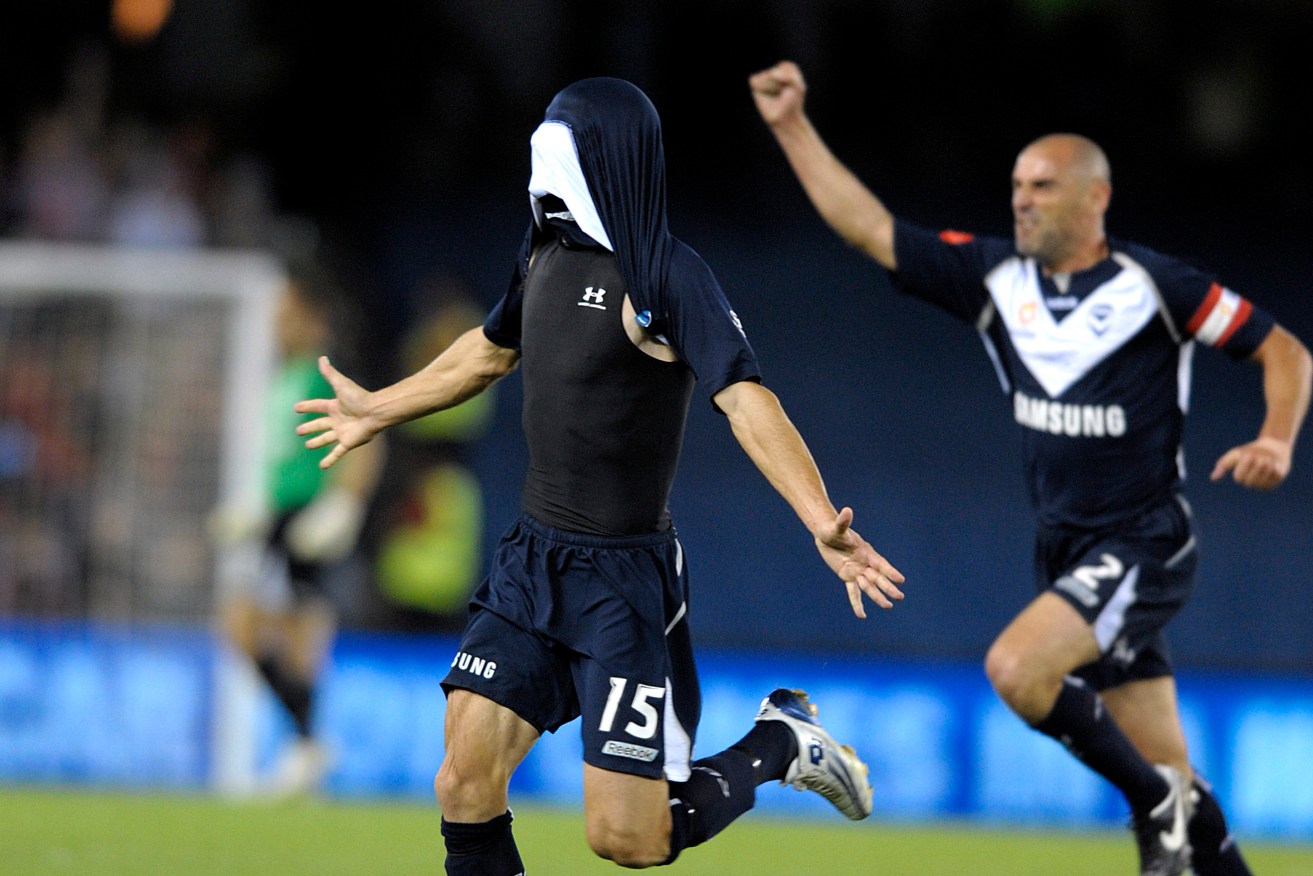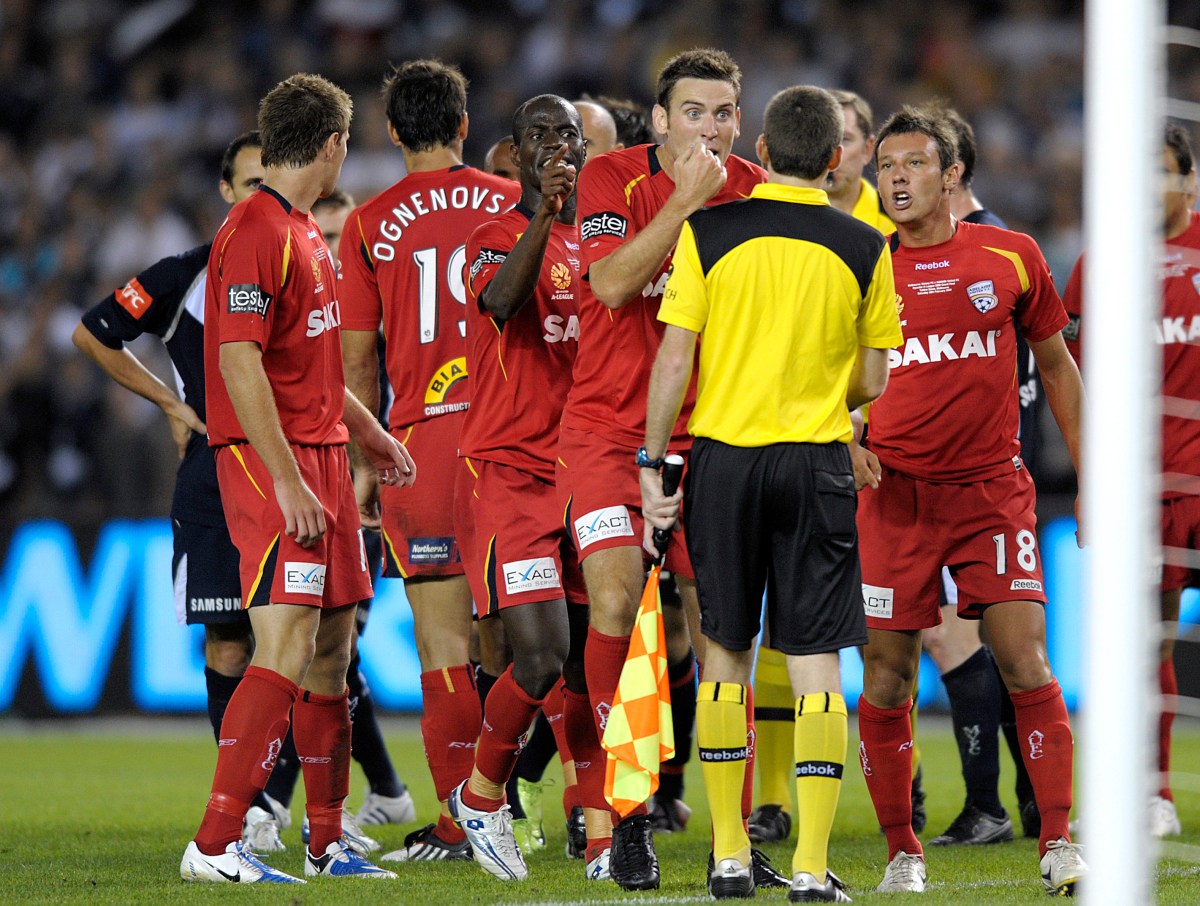Adelaide United’s long wait for Victory
After nearly a decade, Adelaide United faces the prospect of finals revenge against Melbourne Victory. Paul Marcuccitti remembers the incident-ridden 2009 A-League grand final.

Tomislav Pondeljak and Kevin Muscat of Melbourne Victory celebrate Pondeljak's goal in the 2009 A-League grand final. Photo: AAP/Martin Philbey
Much of the nation’s attention was on Victoria in February 2009 and the reason couldn’t have been more tragic.
The bushfires raging through the state claimed 173 lives, displaced thousands of people and left an unprecedented trail of destruction.
Only five months earlier, the collapse of investment bank Lehman Brothers heralded the global financial crisis.
But we had a Prime Minister called Kevin. He was from Queensland and he was here to help.
The PM, who was bringing in his second stimulus package, was clearly going to be leading the nation for some time. The polls put his party’s two-party preferred vote at 58 per cent; for the better Prime Minister question, he had a 64-20 lead over the Opposition’s Malcolm Turnbull.
On the sporting field, the Socceroos were as popular as ever. Despite a disappointing performance at the 2007 Asian Cup, the team was still enjoying the status they’d earned at the 2006 World Cup. In that month – February 2009 – they got a crucial draw in Japan which edged them closer to qualification for the 2010 tournament in South Africa.
And that tournament was surely on its way to our shores. Helpful Kevin had recently approved $45.6 million in government funding for Football Federation Australia’s bid to host the 2018 FIFA World Cup finals.
It was the end of the A-League’s beginning with season four coming to a close. The competition still consisted of just eight clubs but it was already known that two new teams would be added for its next edition: North Queensland Fury and, from the same state, Gold Coast United, owned by a consortium headed by businessman Clive Palmer.
We didn’t know it at the time but, while Palmer was entering the A-League, the businessman that owned Adelaide United, Nick Bianco, was about to hand the club back to FFA.
Here’s another thing we didn’t know in February 2009: the grand final between Melbourne Victory and Adelaide United would be the last meeting between those two clubs in the A-League playoffs for nine years.
Back then it seemed like a month could barely elapse without a match between the rival clubs. That grand final was their 22nd (!) meeting in four seasons.
How?
Firstly, you play each opponent three times in a season; secondly, in those days, the top two teams going into the finals would play a semi over two legs and could still meet again in the grand final; and thirdly, there was a pre-season cup back then.
In both 2006-07 and 2008-09, there were seven games between Victory and the Reds: one in the pre-season cup, three in the regular season and three in the finals. (The pre-season cup was another last – it would be dropped for 2009-10.)
Things began well enough for United which won all three A-League matches against the Melbourne side in the competition’s inaugural season: 2005-06.
Going into the 2006-07 grand final, the Reds still held the upper hand in all meetings between the two teams with five wins to Victory’s three (there had been two draws). But the Melbourne club would famously win the title decider 6-0 and go on to dominate the rivalry.
The 2008-09 campaign could easily have been United’s greatest ever season, despite the premiership-championship double of 2015-16. Two things hindered it: a massive fixture list caused by the Reds’ remarkable run to the final of the Asian Champions League and their subsequent appearance at the Club World Cup and repeated failure against Melbourne Victory.
Despite losing all three regular season matches against Victory, United and the Melbourne team would finish level on points. Indeed, the Reds could have taken the premiership by beating Central Coast by two goals in the final round – of course they won by one.
The playoffs threatened to be an embarrassment. The two-legged major semi-final began with a 2-0 Melbourne Victory win at Hindmarsh. In the return leg at Docklands Stadium, United conceded four times. After that match, Reds’ coach Aurelio Vidmar offered a unique explanation.
Mercifully I hadn’t travelled to the 2006-07 grand final but, after United qualified for the 2008-09 decider (thanks to a 1-0 preliminary final win over Queensland Roar, who were about to be renamed Brisbane Roar) I figured I should be there.
Given their performance in the Asian Champions League and how narrowly they’d missed out on the premiership, I felt the Reds would have been worthy title winners. They’d certainly earned our support on the big day.
The game’s date – 28 February 2009 – was the final day of the arrangement which gave Docklands Stadium its then sponsorship name: Telstra Dome. From 1 March, it would be Etihad Stadium.

It wasn’t Adelaide’s day: United players remonstrate with the referee during the 2009 grand final. Photo: AAP/Martin Philbey
Whatever you called it, it was full. Most of the crowd of 53,000 – the third biggest for any A-League game – was in place while The Presets, whose hit “My People” had been used to promote the competition that season, provided pre-match entertainment.
Unfortunately for the Reds, it would take just 10 minutes for the game to deliver its first setback. United’s Brazilian forward Cristiano jumped for a header and, in the process, his elbow struck Victory defender Rodrigo Vargas.
Cristiano was unlucky to be shown a red card for what appeared to be accidental contact. But referees were already being instructed to treat such contact harshly and the blood streaming from Vargas’ face wouldn’t have helped matters.
What followed, however, was a determined United performance. With 10 players, the Reds kept the score at 0-0 until half time and their ‘keeper Eugene Galekovic only had one genuine save to make.
In the opening minutes of the second half, United nearly took the lead through Scott Jamieson but Victory’s custodian Michael Theoklitos saved sharply. Then Travis Dodd also came close to putting the Reds in front.
But just as there seemed to be some momentum for the undermanned Reds, Victory struck with a long-range effort from midfielder Tom Pondeljak. In keeping with United’s lack of luck, his shot would normally have been saved but Galekovic had his view blocked by other players until it was too late.
A few minutes later, the Reds were thrown a lifeline. After some heated exchanges, Victory forward Danny Allsopp was sent off for headbutting United’s Robbie Cornthwaite behind play. It was the only time fortune favoured the away side – replays showed little if any contact.
Now there would be around 25 minutes with both sides reduced to 10 players.
United’s best chance of equalising came with 10 minutes remaining. Brazilian full back Cássio crossed for Paul Agostino but, despite being in perfect position, he missed the ball completely. A pity – the former Socceroos striker was playing his last professional match.
After the match a friend in a high place got me into the dinner for United’s players and officials. I ended up being seated next to the club’s then CEO, Sam Ciccarello.
As I hadn’t been expecting to be at this dinner, I was wearing my red United top and jeans – everyone else on the table was in a suit.
To underline that it really wasn’t the club’s day, the catering at this Docklands establishment was completely disorganised and food didn’t arrive until around midnight. Staff then began serving the tables that didn’t include players first. Ciccarello got up and made sure the order was changed so that the exhausted young men didn’t have to wait another minute to fill their bellies.
Nothing that happens on Sunday, when the Reds face Victory in an A-League finals match for the first time since 2009, will make up for that disappointment or the ones before it. But, at long last, there’s a chance to record a first playoff win against United’s old foe.
Rather than look too far ahead in this season’s finals series, let’s just appreciate the occasion and hope that it’ll be as memorable as some of those meetings in the A-League’s early years.
But with a better result!
Paul Marcuccitti is InDaily’s soccer columnist.




